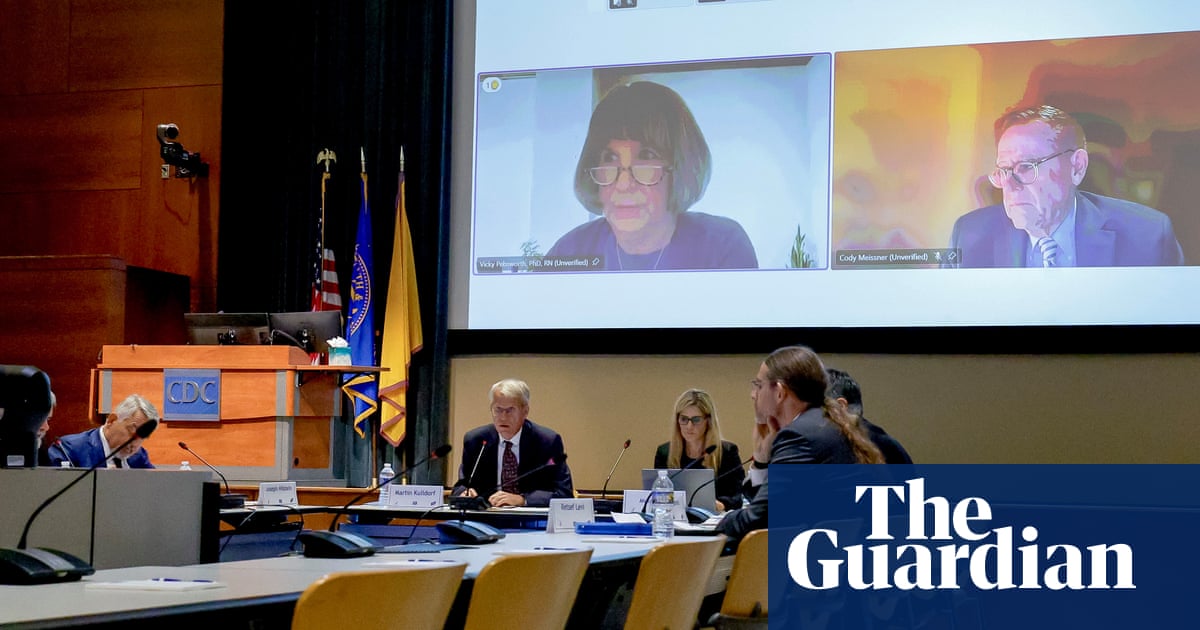Robert F Kennedy Jr’s newly appointed vaccine advisory panel is facing criticism from pediatricians after its announcement of plans to reassess the current vaccination schedules for children and adolescents.
Experts warn that the move appears designed to undermine public trust in immunization.
The chair of the American Academy of Pediatrics (AAP) Committee on Infectious Diseases, Dr Sean O’Leary, said during a Wednesday press briefing that the rest of the world is looking at the US and its new Advisory Committee on Immunization Practices (ACIP) “in horror”.
“It is truly an embarrassment at this point, what’s happening with ACIP,” said O’Leary.
While the new ACIP has instigated chaos among vaccine policy infrastructure during their Wednesday meeting, the AAP emphasized a need to continue a commitment to publishing independent, science-based vaccine guidelines.
Wednesday marked the first ACIP meeting since health secretary Kennedy dismissed all 17 existing voting members and installed eight new ones, a group that reportedly lost one member before the meeting convened. Some of these new appointees have been associated with the spread of vaccine misinformation.
The AAP representatives abstained from participating because they view the new ACIP as “illegitimate”. The AAP’s own meeting was scheduled to immediately follow the ACIP session, giving pediatric experts an opportunity to respond to the new committee’s statements and direction.
“What we heard in this meeting was really a false narrative that the current vaccine policies are flawed and that they need fixing. That’s completely false,” said O’Leary.
“Vaccine policies have saved millions of lives, trillions of dollars, and our immunization system is a model for the rest of the world.”
Among ACIP’s early initiatives is a separate working group that plans to examine vaccines that have not undergone a recent review, specifically those not studied in over seven years. One vaccine that drew immediate attention is the hepatitis B birth dose. O’Leary criticized the focus on reviewing vaccine schedules, which he says “has been an anti-vaccine trope for many, many years”.
A schedule review “sounds good at first glance, but the fact is, these vaccines are essentially always being reviewed in real time through a number of different mechanisms, safety surveillance mechanisms, as well as disease surveillance mechanisms”, O’Leary said.
“The hepatitis B birth dose is one of the cornerstones of our hepatitis B prevention policy here in the US, and it has been highly successful in reducing the rate of perinatally acquired hepatitis B,” he added.
An AAP article says that infants infected with hepatitis B at birth face a 90% likelihood of developing chronic infection. Without medical intervention, roughly 25% of those children will die from the disease.
Kennedy’s decision to overhaul ACIP has sparked concern among medical professionals. The new panel’s review includes vaccines like the MMR shot, which protects against measles, mumps, rubella, and varicella (chickenpox), as well as the hepatitis B vaccine given at birth.
“We do still need to maintain higher coverage in the US of MMR, you’re seeing the measles outbreaks in real time,” O’Leary said.
“We need to maintain very high measles vaccination coverage. And this ACIP discussion, to me, is designed to sow distrust in measles vaccination.”
The US is now enduring the largest measles outbreak in decades. Centered in west Texas, the measles outbreak has killed two unvaccinated children and one adult and spread to neighboring states. Measles had been declared eliminated from the US in 2000, but it has been spreading in under-vaccinated communities.

 4 hours ago
1
4 hours ago
1










 English (US)
English (US)